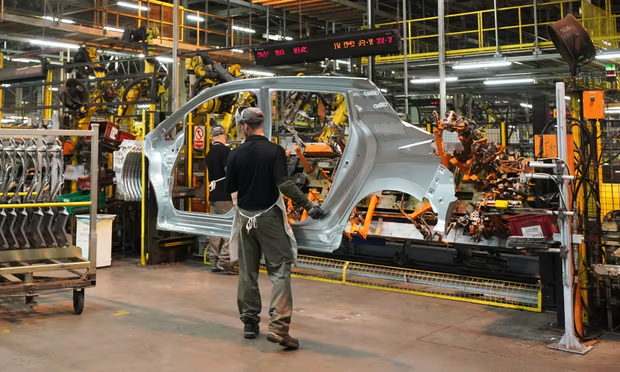In a significant move aimed at navigating the increasingly tense global trade landscape, UK Labour leader Keir Starmer has offered major US technology companies a substantial reduction in the country’s Digital Services Tax (DST). In return, Starmer seeks concessions from Donald Trump’s administration, including lower tariffs on UK exports. This proposal comes as the UK braces itself for a potential global trade war that could have serious economic ramifications.
A Tactical Offer to the US Tech Giants
According to sources familiar with the negotiations, the UK government is willing to lower the headline rate of its 2% DST, which currently targets the UK revenues of major tech firms like Amazon, Meta, Alphabet, eBay, and Apple. The reduction is seen as a strategic move to placate the Trump administration, which has repeatedly criticized DSTs around the world, accusing them of unfairly targeting US-based companies.
The UK’s offer goes further than just appeasing the Americans; it includes expanding the scope of the DST to include smaller tech companies from other countries. This would result in a broader tax base, with the UK government estimating that the DST could raise up to £1.2 billion annually by the end of the decade—up from the current £800 million.
In essence, the proposal aims to ensure fairness in the tax system, addressing US complaints while also ensuring that the UK government’s revenue targets from tech companies remain intact. Tech firms generating more than £500 million in global revenue and over £25 million from UK users are liable for the tax, which has garnered criticism for disproportionately impacting larger firms, many of which have lobbied for reductions.
A Bargain With Trump: Trade Concessions in Exchange for Tax Cuts
The move to offer US tech firms a tax cut is part of a broader trade deal with the United States, with the UK hoping to secure exemptions from the tariffs President Trump has indicated he will impose on imports. In particular, the US is planning a 25% tariff on all car imports, which could have devastating consequences for the UK’s automotive sector. The Institute for Public Policy Research (IPPR) warns that such tariffs could threaten up to 25,000 jobs in the UK’s car manufacturing industry, as one in eight cars built in the UK is sold to the US market.
In addition to discussions about the DST, the UK is also reportedly negotiating on agriculture, with the government considering lowering tariffs on imports of US beef, chicken, and other meats. While this is seen as a way to strengthen the trade relationship with the US, it is likely to face strong opposition from UK farmers, who are already upset by changes to inheritance tax rules affecting agriculture.
The Road Ahead: Trade War Looms
As the UK government grapples with the prospect of escalating trade tensions, Downing Street remains hopeful that a comprehensive trade agreement with the US can be reached, offering a lifeline in the face of Trump’s global tariff threats. The government has said that it is “keeping all options on the table” in terms of retaliation but has not yet made public any plans to impose counter-tariffs.
Experts are watching closely as the White House prepares to announce the next steps in its trade policy, with Trump’s administration expected to impose tariffs on goods from several major economies. While the UK remains optimistic that a trade deal could secure exemptions from these tariffs, the initial phase could see significant disruptions, particularly for industries reliant on exports to the US.
Conclusion: Navigating a Complex Trade Landscape
Starmer’s offer to lower the DST in exchange for trade concessions represents a delicate balancing act for the UK government, which is trying to protect its domestic industries while maintaining a favourable relationship with the US. However, the success of these negotiations will depend on the broader context of the evolving global trade war, which could see the UK caught between competing economic pressures.
The coming weeks will likely reveal whether this strategy can secure the UK the trade exemptions it needs to safeguard jobs and economic stability, or whether it will find itself ensnared in a broader conflict that threatens its financial plans. Either way, the UK’s relationship with the US, and the future of global trade, are poised to take centre stage in the coming months.



